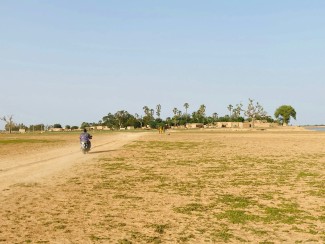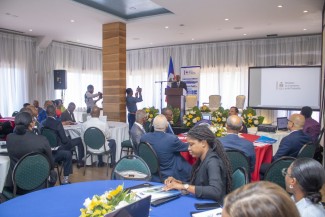Originally published by the Commonwealth Secretariat
Least Developed Countries are set to benefit from an agreement that unites the work of the Commonwealth and the World Trade Organization (WTO) to boost commerce.
Commonwealth Secretary-General Patricia Scotland today signed a Memorandum of Understanding (MoU) with the trade body’s Enhanced Integrated Framework (EIF), during a two-day summit on inclusive trade at the WTO headquarters in Geneva.
The agreement will support Commonwealth Least Developed Countries (LDCs), many of which also fall within the category of Small and Vulnerable Economies and Small Island Developing States.
The collaboration is one of the first of the communique commitments from the Commonwealth Heads of Government Meeting to be delivered. At the biennial summit in April, leaders of the 53 member reaffirmed their commitment to free trade in, "a transparent, inclusive, fair, and open rules-based multilateral trading system, which takes into account the special requirements of least developed countries and small and vulnerable economies."
In addition, they welcomed initiatives to, "strengthen the Commonwealth Small States Office in Geneva through the provision of additional resources and the sharing of technical expertise that enables small and developing states to participate in the multilateral trading system and benefit from trade-related economic growth."
LDCs currently only account for less than one percent of all global trade. While it still represents a tiny percentage, that figure is more than double among Commonwealth countries (two percent) and is expected to grow further to 2.2 percent by 2020.
In an effort to break this cycle (the global figure has remained around one percent for more than a decade) the MoU will see Commonwealth and WTO collaboration on trade-related research, technical assistance, impact assessments and capacity building for LDCs.
Speaking at the signing, Secretary-General Scotland said, “strategic partnerships are indispensable if we are to deliver on the objectives agreed with our member countries, around a quarter of which are currently classified as Least Developed Countries."
“Our Memorandum of Understanding builds on the collaborative working relationship we have developed with the EIF over recent years, and the intention is that together we will provide broader support to our members through the transition process.”
The MoU will also help countries work towards United Nations Sustainable Development Goal 17.11, which aims to double the least developed countries’ share of global exports by 2020.

It is expected that, between 2021 and 2025, Solomon Islands, Vanuatu, Bangladesh, Kiribati and Tuvalu will have progressed beyond LDC status.
Discussing the importance of supporting Least Developed Countries, Director-General of the World Trade Organization, Roberto Azevêdo said, “the Enhanced Integrated Framework is the driving force behind this forum. The EIF is the only multilateral partnership dedicated exclusively to assisting the LDCs to trade. It plays a vital role in helping these countries use trade as an engine for growth, poverty reduction and sustainable development and it has made a real impact on the ground.”
Commenting on the direct benefit to Commonwealth countries, Mr Azevêdo said, “In Malawi, the EIF has stimulated more than US$47m in agricultural exports. And in Samoa, the EIF has helped over 650 farmers to achieve certification as organic. This will boost incomes by over US$200,000 annually.”
Secretary-General Scotland also took part in a panel discussion, alongside Uganda’s Trade Minister, Cambodia’s Secretary of State for Commerce, and the Executive Director of the International Trade Centre.
The discussion, titled Forging new paths for LDCs in multilateral and regional trade, focused on ways in which to integrate LDCs into regional and global trading systems amid economic and political uncertainty.
Addressing an audience of more than 300 global trade experts, Secretary-General Scotland said, “Given our Commonwealth advocacy for more effective disbursement mechanisms, we welcome the continued strengthening of the Enhanced Integrated Framework as a central pillar in the architecture for international support and distribution of Aid-for-Trade resources within the World Trade Organization.”
Following the signing of the MoU, the Executive Director of the Executive Secretariat for the EIF, Ratnakar Adhikari, said, “this means a lot for Least Developed Countries. The Commonwealth Secretariat has a good knowledge and the expertise that is necessary to help these countries on issues relating to trade and investment. We would like to use this MoU as an opportunity to advance our work in these areas to enable LDCs graduate from the group of LDCs. That graduation is something we want to see in a sustainable manner, which is something for which this partnership will be instrumental.”
Permanent Representative to the United Nations Office at Geneva, Robert Salama, said, “one of the areas the Commonwealth can assist Malawi with is in the development of skills, because we need our people to be empowered. For example, digital skills are becoming very important and it is an area that I think we can benefit from as a member of the Commonwealth.”
If you would like to reuse any material published here, please let us know by sending an email to EIF Communications: eifcommunications@wto.org.



